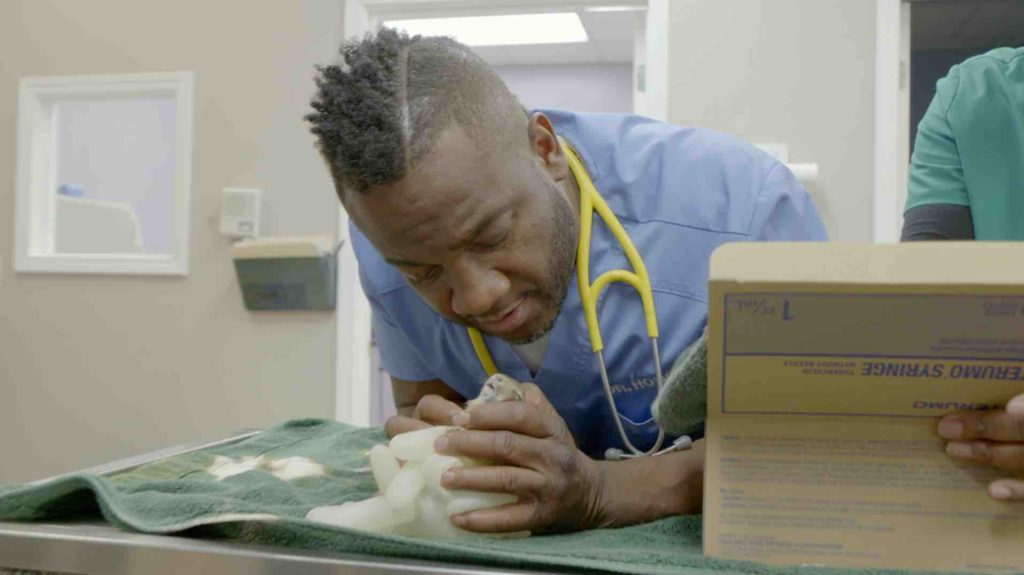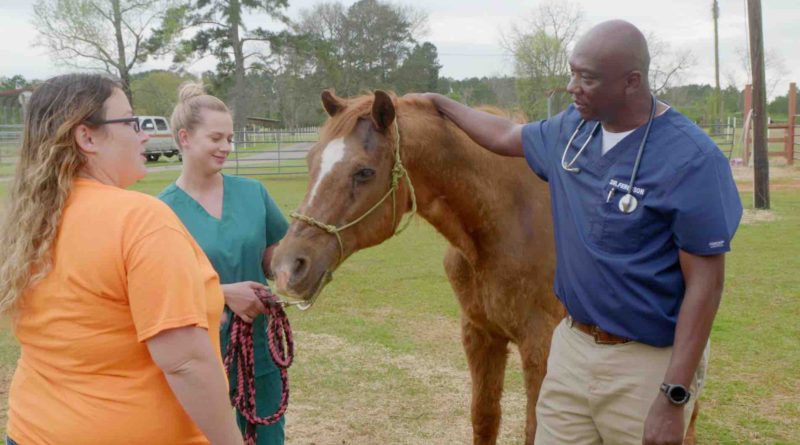INTERVIEW: These veterinarians are ‘Critter Fixers’
Photo: From left, Tiffany Newman, senior vet tech Jordan and Dr. Terrence Ferguson discuss Ember the horse’s skin condition. Photo courtesy of Nat Geo Wild / Provided by press site with permission.
In the small town of Bonaire, Georgia, there’s a thriving veterinary practice known as Critter Fixers, and the two doctors at the helm of the business, Vernard L. Hodges and Terrence Ferguson, are ready to take their adventures to a much wider audience.
Nat Geo WILD is set to premiere Critter Fixers: Country Vets Saturday, March 7 at 10 p.m. On the show, Hodges and Ferguson must expect the unexpected. The two longtime friends and professional partners, along with a dedicated staff, treat more than 20,000 patients, according to press notes. They take pet visits at their clinic and also head out into rural Georgia to help cattle and other farm animals with a variety of ailments and illnesses.
On the inaugural season of the new reality series, the veterinarians will help a police dog who has been stuck with cactus thorns and a potbelly pig with life-threatening lacerations, and everything else in between.
Recently Hollywood Soapbox exchanged emails with Hodges and Ferguson. Questions and answers have been slightly edited for style.
What inspired you to become a veterinarian?
Hodges: I’ve loved animals all my life. I grew up in the country around animals, and I always wanted to help. My initial focus was fish; I thought I’d be the next Jacques Cousteau! After I went to veterinary school, I decided that a small animal practice would be more fulfilling.
Ferguson: I wanted to be a veterinarian from a young age. When I was 7 or 8, I had a dog that was hit by a car, and I tried to doctor him back to health. I got some rubbing alcohol and put on his wounds, and he improved. It wasn’t until later in life that I realized his condition wasn’t that extreme, but by that time my path was set! My mother was an educator, and she cut out the letters that spell veterinarian. She told me if it was my dream to become a veterinarian, I had to learn how to spell it. That almost changed my mind!
What are some of the most common ailments that you see amongst your patients?
Hodges: In the summer, we see an incredible amount of snake bites. Dogs are very curious, and sometimes they stick their noses in the wrong place! Year round, the most common ailment is pancreatitis because we all love to feed our dogs things that they shouldn’t eat.
Ferguson: We live in the Deep South, and due to the climate, allergens run rampant. We treat pets for a variety of allergies. We do allergy testing, and pets have the same allergies as their owners.

Did you immediately say yes to having cameras document your workplace?
Hodges: Immediately, no. At first, I thought it was a scam! I was approached on Instagram, and I didn’t think it was a legitimate request. Once we realized this was really an opportunity to showcase our practice on National Geographic Wild, we were all on board.
Ferguson: No. Dr. Hodges called me and said a group wanted to film us. Initially I agreed, but I didn’t think it would really happen. When I found out it was a go, I had to think of the pros and cons. I was a bit apprehensive; I wasn’t sure how I would feel with a camera following my every move. So far, it’s been positive, and I’m excited to see what the future holds.
How do you effectively manage a veterinary hospital that has 20,000 patients? What’s the key to success?
Hodges: By delegating tasks and having the right team. I have employees who have been with me for almost 20 years. They know my management style and my expectations, and together we make magic.
Ferguson: In order to manage 20,000 patients effectively, the key is our staff. We’ve had employees who have been with us for a long time, and they are very efficient. There was a long period of time that Dr. Hodges and I had to do everything ourselves, and it’s amazing to have a staff that understands how we do things.
Will you be watching the episodes on television, or would you prefer not to watch?
Hodges: I’m a little nervous about watching, but I will definitely tune in. It will be weird watching myself on the big screen!
Ferguson: Honestly, I would prefer to watch it in my bedroom alone, but I wouldn’t do that! We’re going to have a premiere party and invite our family, friends and clients to share in the experience.
How do you deal with the inevitable heartbreak of seeing a family say goodbye to a pet?
Hodges: Honestly, this is something that doesn’t get easier, even after 20 years. I will often spend time with the family reminiscing about the good times we had with the patient.
Ferguson: That is the most difficult part of our job. The only thing that makes it understandable — not better — is knowing that we are saving the animal from suffering. We know that it’s a difficult decision for our clients, but we try to comfort them by letting them know we are there for them.
By John Soltes / Publisher / John@HollywoodSoapbox.com
Critter Fixers: Country Vets premieres Saturday, March 7 at 10 p.m. on Nat Geo WILD. Click here for more information.


Love this show and the vets!
So caring as well as knowledgeable. Nice variety of animals and illness